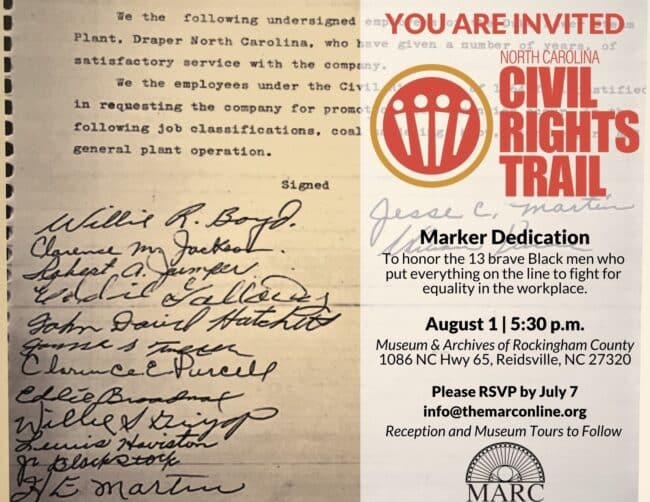In 1966, 14 Black employees at the Duke Power Steam Station in Draper, North Carolina filed a complaint with the Equal Employment Opportunity Commission. The workers claimed that they were denied promotions and transfers, and that newly implemented policies favored white workers. After a five year court battle in the case of Griggs v. Duke Power Co., on March 8, 1971, the Supreme Court delivered its landmark unanimous ruling prohibiting discriminatory practices by employers. It was the first case of its type and the case established legal precedent for future “disparate-impact” lawsuits.
According to the North Carolina African American Heritage Commission,
Encouraged by members of the Reidsville Chapter of the NAACP, especially its leader James A. Griggs, the plaintiffs challenged the newly implemented employment requirements of a high school diploma and intelligence tests. They claimed these requirements were unrelated to performing the jobs in question and that Duke Power Company’s policies discriminated against African American employees in violation of Title VII of the 1964 Civil Rights Act.
Furthermore, they requested that they be given promotions to jobs within the company when vacancies should occur. In bringing the case, filed in October 1966, the Griggs plaintiffs were represented by NAACP Legal Defense Fund attorneys led by Julius Chambers. Willie Boyd would become the spokesperson for the plaintiffs. They sought to change hiring and promotion practices, breaking down a powerful barrier to African American advancement and bringing greater equity to the workplace. The case took nearly five years to work its way through the courts, culminating in oral arguments before the U.S. Supreme Court in December 1970. [Read more.]
High school history teacher Valencia Abbott worked with the National Council of History Education to create professional development opportunities and an oral history project (with her students) related to the Griggs v. Duke Power Co. case. In the essay “Rural Education in Rockingham County During the Jim Crow Era” Abbott writes,
 The overall relevance of this project, which I have been working on since 2018, is that we are saving history, particularly Black History, which oftentimes is neglected or falls through the crevices of having actual documentation.
The overall relevance of this project, which I have been working on since 2018, is that we are saving history, particularly Black History, which oftentimes is neglected or falls through the crevices of having actual documentation.
Before becoming a teacher, I worked at a customer service job, and the motto was, “if it isn’t documented, it didn’t happen.” Even though we know actual history is not that way, it can seem that way. So these stories must be documented.
Now local History, in a place that most people have never heard of, Rockingham County, North Carolina, is bringing attention to a piece of the Civil Rights Movement narrative that should have been rightly placed before.
This local, rural history will be receiving a North Carolina Civil Rights Trail Marker and a North Carolina Highway Historical Marker. [Read more.]
Thanks to her work, a plaque commemorating this landmark was dedicated in August 2023. Read more here a North Carolina Highway Historical Marker Program.

Abbott chose sites related to the Griggs case history for her early activation of the Teach Truth Day of Action. See photos below of one of the workers in the case, key locations, and Abbott with #TeachTruth signs.







Twitter
Google plus
LinkedIn